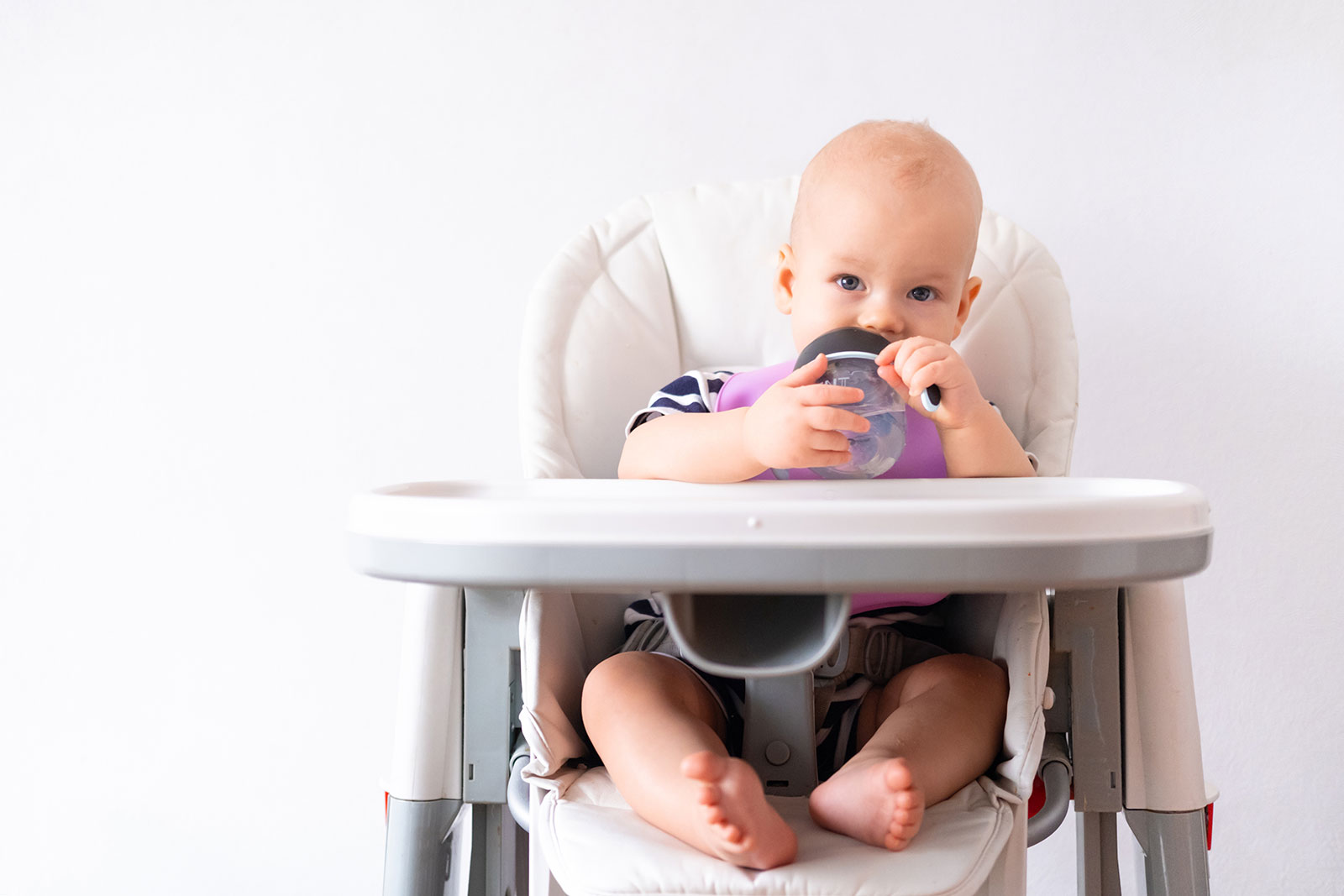[ad_1]
Once your child reaches 6 months of age, you can start offering small amounts of water. Here’s why not to give it to them before then, and how to offer those first sips and know how much they need.

Babies and Water
It’s certainly true that water is essential to our health. But when it comes to newborns and younger babies, they get all the hydration they need from their formula or breast milk. And, in actuality, giving water to babies younger than six months old can cause problems.
Newborns’ stomachs are so small that you don’t want to fill them up with water so they aren’t hungry for feedings—breastmilk and formula have the nutrients and hydration babies need.
Another reason water is a no-no before six months is because if your baby has too much, it can cause something called “water intoxication” where a baby’s kidneys flush out more sodium than they should. (Symptoms of this include irritability, low body temperature, drowsiness, and swelling.)
A few sips of water in the bathtub isn’t a concern, but we do want to keep an eye if they seem to be gulping water.
How to Introduce Water to Baby
Once your baby is six months old, you can start introducing a small amount of water with meals. This can help them move the food around in their mouths and also aid in hydration.
Offer it in an open, straw cup, or sippy cup, which can keep them from taking too much at a time. It’s also a good opportunity to practice drinking from something other than a bottle or breast, which is a skill they need to master as they grow.
You can give your baby about 4 to 8 ounces of water a day from six to 12 months, but note that this should not replace a formula or breast milk feeding at this point. Instead of tracking ounces, offer a little with meals and snacks (if offering snacks), and at natural points during the day when they might be thirsty (just like how you drink water).
As your child grows you can add more water into their routine: Toddlers ages 12 to 24 months need about 1 to 4 cups of water a day, and the recommendation goes up to 1 to 5 cups for 2-to-5 year olds.
TIP: You can find recommendations for the best transition sippy cups for water here.

Frequently Asked Questions
Babies under the age of six months get all the hydration they need from breast milk or formula. Giving them water can take up space in their tiny stomachs, leaving them less hungry for feedings.
Drinking too much water too quickly can also cause a baby’s kidneys to flush out too much sodium causing something called “water intoxication” in babies. (This is rare, but keep an eye on baby in the bath to limit how much they may be drinking.)
If your baby is six months or older, it’s okay to give him or her about a half cup to a cup of water a day. However, this shouldn’t replace any feedings at this point so it’s not critical that they drink the full serving every day. It’s more about getting them used to water, as well as practicing drinking from a cup or sippy cup.
If they won’t drink it, simply keep offering it. It can take babies a while to get used to new things. You can also try out different types of open, straw, or sippy cups to see if you find one your baby likes better.
You can start giving your baby water with meals at 6 months old. (They should get about 1/2 to 1 cup of water a day from ages 6 months to a year.)
It’s best to use a transition sippy cup, straw cup, or small open cup for this age.
Top Tips for Giving Babies Water
- Newborns ages 0 to 6 months get all the hydration they need from breastmilk or formula. They should not have water.
- Giving newborns water isn’t recommended because it can fill them up and cause them to miss feedings that they need. (Too much water can also cause a rare condition called “water intoxication.”)
- Once your baby is six months old, you can start introducing a small amount of water with their meals. Offer it in an open cup, straw cup, or sippy cup.
- The recommended daily intake of water for babies ages 6 to 12 months is about 4 to 8 ounces. This goes up to 1 to 4 cups of water a day for ages 12 to 24 months and 1 to 5 cups for 2-to-5 year olds.
- You can read about Babies and Salt and when to Start Solids.
I’d love to hear any questions you may have, so comment below!
[ad_2]
Source link


